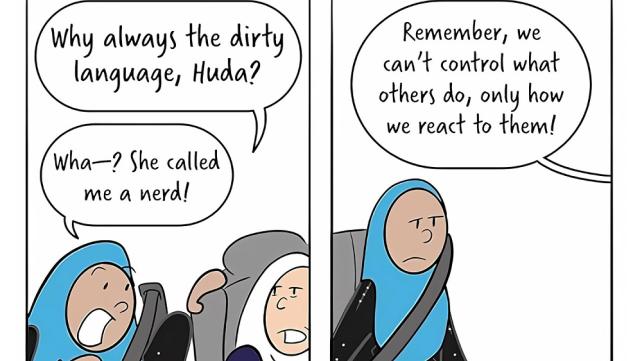
Instilling an Islamic worldview can be difficult for parents who are raising children in the West. So many things around us – both online and in real life – contradict Islamic values, and the desire to fit in can be overpowering for Muslim youth. Huda F Cares? by Huda Fahmy is a graphic novel for teens and young adults that addresses some of the challenges of maintaining a strong Muslim identity in the U.S.
With wry humor and charming illustrations, Fahmy tells a semi-autobiographical story about her visibly Muslim family driving from Michigan to Florida to visit Disney World for the first time. Main character Huda and her four sisters are excited to explore the amusement park without their parents and enjoy some independence, but they face several challenges along the way.
Fahmy clearly understands the conflicted feelings of many young Muslims in the U.S.. Her protagonist cares deeply about her faith but also struggles with being so conspicuous in a non-Muslim environment. For instance, Huda feels deeply self-conscious when her family decides to pray in an open, grassy area at a rest stop:
“The world is our masjid,” says her mother.
“I’m gonna go pray in the car,” responds Huda.
“Are you ashamed of being a Muslim?” her mom demands.
“No, it’s just . . .” protests Huda. “I hate making wudu in public bathrooms.”
Fahmy then illustrates a scene that many Muslim Americans will recognize and chuckle at: Huda and her sisters are making wudu in a public restroom when a non-Muslim woman walks in and stares at them as they rinse their bare feet in the sink.
“You wanna take a picture, lady?” asks Huda’s sister.
On the next page, Fahmy shows Huda’s discomfort as she and her family pray on a blanket spread out in the grass near a parking lot.
“Praying in public is even more nerve wracking,” Huda says to herself.
Upon arrival at Disney World, Huda immediately sees many people engaging in un-Islamic behavior: unmarried couples kissing, a man drinking beer, and girls wearing skimpy outfits. “How did Mama and Baba decide to bring us here?” she asks her sister. “There’s so much that’s like the opposite of everything they taught us.”
Later, after getting in trouble for talking to a boy (even though she was resisting his advances), Huda confronts her parents: “You bring us to a place known for its stories about kids disobeying their parents, but you still expect us to fit into your perfect bubbles?”
Many parents and children will relate to Fahmy’s scenarios. Often, their attempts to have fun in a non-Muslim society expose families to things that contradict their faith. Parents often try to find a balance between letting their children participate in mainstream activities (like visiting popular amusement parks) and upholding their Islamic values, but kids can be confused by mixed messages and double standards.
Can Muslim parents instill an Islamic worldview in a non-Muslim society? Even at places like Disneyland? Fahmy addresses this topic when Huda’s Mama and Baba give a long talk to their children:
“Well, it’s time we finally explained. Yes, we came to this park to bond as a family and to build memories together. But also, to learn that the real world is not always going to be on level with our beliefs. And that shouldn’t stop us from living our lives. It’s about enjoying the good and leaving the bad. You don’t have to compromise what you care about to have a good time. We try to protect you by sending you to the masjid and to the right schools. But we know you’re going to have to learn to find a balance for yourself. We can’t keep you in a bubble forever. We just want you prepared before you eventually set out on your own.”
Huda F Cares? tackles some other complex topics, as well. On their vacation, Huda and her sisters experience Islamophobic remarks, insults, and even sexual harassment. A young man puts his arms around Huda without permission and flirts with her and her sister, ignoring their protests. He then threatens to pull off her sister’s hijab. Huda’s sister punches the young man, landing her in a security guard’s office, even though she was acting in self-defense. Given that these are scenarios that many Muslims actually face, Fahmy’s book can be a useful springboard for discussion with our teens.
One thing I really admire about Fahmy’s graphic novels is that her message is always positive about Islam. Huda is an imperfect but lovable character. She sometimes struggles with practicing her faith openly and often complains about her family drama, but she always knows in her heart that pleasing Allah should be her first priority, and that her family is a blessing, despite their flaws. She is a good role model for Muslim youth, and these graphic novels give voice to the challenges Muslim kids today are facing.
Laura El Alam is a freelance writer and editor and the author of the book Made From the Same Dough, as well as over 100 published articles. A wife and mother of five, Laura lives with her family in Massachusetts. You can visit her online at www.seaglasswritingandediting.com.



Add new comment